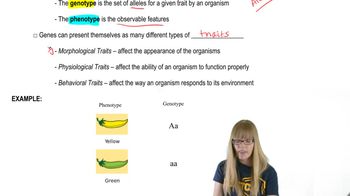Here are the essential concepts you must grasp in order to answer the question correctly.
Autosomal Recessive Inheritance
Autosomal recessive inheritance refers to a pattern where two copies of a mutated gene (one from each parent) are necessary for an individual to express a recessive disorder. Carriers, who possess one normal and one mutated gene, do not show symptoms but can pass the mutated gene to their offspring. This concept is crucial for understanding how the disorder can manifest in children of parents who are both carriers.
Recommended video:
Carrier Frequency
Carrier frequency is the proportion of individuals in a population who carry one copy of a recessive allele for a genetic disorder. In this case, with a carrier frequency of 2 percent, it indicates that 2 out of every 100 individuals are carriers. This statistic is essential for estimating the likelihood of two carriers mating and having an affected child, especially in consanguineous relationships like first cousins.
Recommended video:
New Alleles and Migration
Inbreeding and Genetic Risk
Inbreeding, or mating between closely related individuals, increases the probability that both parents carry the same recessive allele, thereby raising the risk of offspring inheriting the disorder. In the case of first cousins, the genetic relatedness is higher than that of unrelated individuals, which can significantly elevate the risk of recessive disorders manifesting in their children compared to the general population.
Recommended video:






